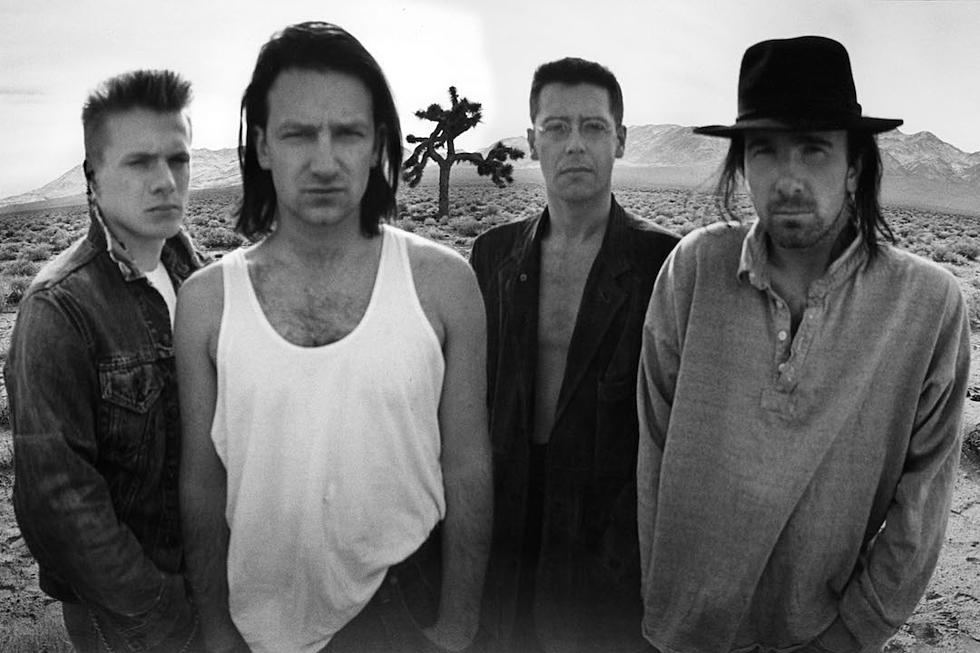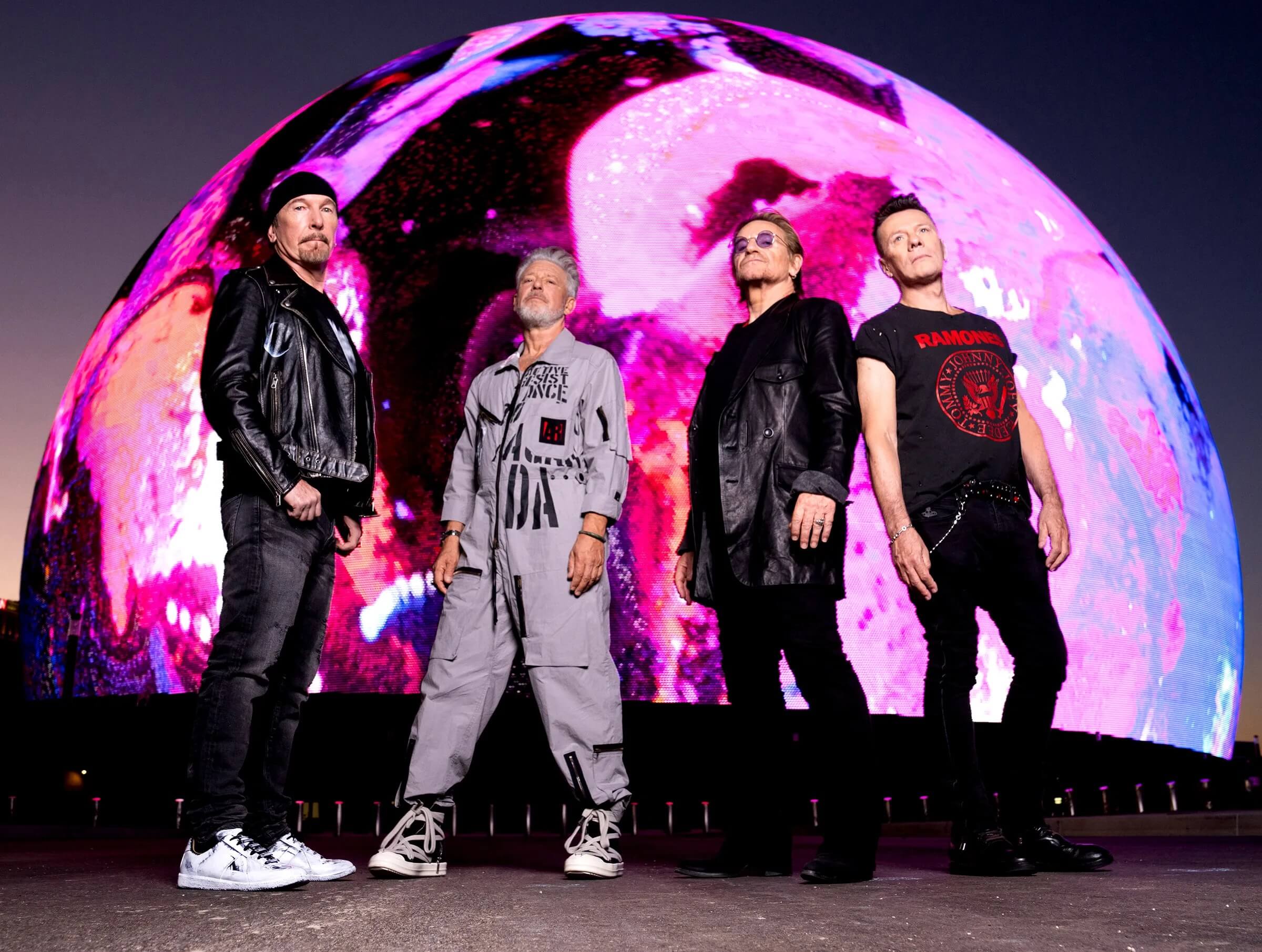Recently, I got a chance to see U2 perform at Sphere in Las Vegas and was absolutely blown away. For those who don’t know, Sphere is a venue covered in 589,000 square feet of LED lights and screens—basically the equivalent of having 42 IMAX screens in one seamless canvas. It also has 167,000 speakers, including sound that can come through the floor; the acoustics are simply amazing. However, when I entered the space before the show, I didn’t really see anything in terms of speakers, lights, or the traditional rigging that one would normally see in a concert venue. We walked in and saw what looked like a concrete cistern with what appeared to be small speakers on the wall. Looking up, there was a hole in the ceiling, and periodically a bird would fly over. Soon, U2 came out, the concrete collapsed, and light appeared to burst through the wall.
(It took me a day to realize, foolishly, that the concrete-looking backdrop and roof opening were all a special effect.) The technological and artistic aspects of the show were stunning—not to mention how incredible U2 are as performers.
I emerged from the show energized, but I was also reminded that the world we are creating for ourselves requires us to offer students as broad-based an education as possible. That show involved music, visual art, computer programming, literature, engineering—sound and construction—and lots and lots of math.
The contrast between Las Vegas and my last U2 show was stunning. When I saw them in 1987 in Tucson during one of the opening nights of the Joshua Tree tour, they were at their minimalist best. There was barely a set—just four guys playing amazing music. At that stage, they were beginning to peak creatively—not only as musicians, but lyrically. They were establishing themselves as humanitarians.

At that time in Arizona, we had a governor who wanted to repeal the Martin Luther King Jr. Day holiday. Bono was enraged by this and got involved in supporting a recall election to save that important holiday. Their legacy is pretty amazing. The band—composed of Bono, the Edge, Adam Clayton, and Larry Mullen Jr.—are lifelong artists, activists, learners, and leaders. If there were a band that might live the CA mission, it is probably U2. Throughout their career, as a band and as individuals, they have campaigned for human rights and social justice causes, working with organizations and coalitions that include Amnesty International, Jubilee 2000, DATA/the ONE Campaign, (Product)Red, War Child, and Music Rising. They have experienced incredible success. U2 has won more than 20 Grammy Awards over the course of their career, including album of the year for both The Joshua Tree and How to Dismantle an Atomic Bomb. The band was inducted into the Rock and Roll Hall of Fame in 2005 and received Kennedy Center Honors in 2022.
They are a distinctly Irish band, hailing from Dublin and being witness to the Troubles in Northern Ireland. My brother is a minister and had an internship at a Protestant church in Belfast. I visited him for three weeks in 1995, just as the truce was taking hold. His church had been in negotiations with Sinn Fein and the Unionists. I remember seeing burned-out buildings, having a rifle pointed in my face by a British soldier, and being in a Republican or Catholic bar late at night when an IRA “Provo” asked my brothers and me if we enjoyed baseball. Then, he pulled out a bat and asked my brother what he was doing in Belfast and what his job was—we learned that this IRA member’s job during the truce was to ensure that young Catholics didn’t cause any trouble. His job was to enforce the peace with a baseball bat. It was jarring.
That experience led me to read deeply about the Troubles and how Northern Ireland found peace. Northern Ireland’s history is so complicated—but at the same time it isn’t. Extremist forces on both sides kept that country at war in horrific ways. If you visited Belfast in the 1990s, and even now, you see countless murals of Provo and IRA terrorists who killed innocents.
U2 was shaped by this—even though they were safe in Dublin—but they did the world a service by sharing their experience and perspective. At the concert I saw in Vegas, Bono and the Edge sang an acoustic version of “Sunday Bloody Sunday,” which documented a day on which peaceful protestors were killed. Bono’s extraordinary introduction noted that the song is about peace, and that there were people in Ireland who sought peace in “ridiculous” ways. My brother’s mentor was a pastor who was one of those people who engaged in direct negotiations with his enemy.

I want our students to be “ridiculous” in their efforts to make this world a better place. I was raised in the Welsh Presbyterian tradition, which holds that the Christmas season is about peace and harmony. U2 is a band that found a way to be alchemists—merging their art with their sense of social justice. And in the process, they earned commercial success. They also continually innovated and grew. And, although some have considered them sell-outs, they realized that working with people and organizations that have power, rather than just throwing metaphorical and verbal bombs, could have more impact. They were able to convince authorities not typically sympathetic to the AIDS epidemic that it was a human issue and the moral thing to do was to find remedies and cures.
As they have evolved, they have merged music, technology, art, and business. Las Vegas was an amazing show, but it signaled to me the kind of world our kids are going to enter. They will need the ability to transcend boundaries and be interdisciplinary in all things. The coding power required to pull off the visuals, as well as their own analog and age-old human talent of playing an instrument, all had to come together.
We have a responsibility as educators to not be complacent and to look to the future. The world is changing. We must help our kids be leaders who take on what may seem like “ridiculous” ideas with passion. The whole idea of a venue like The Sphere is ridiculous in its own right, but that venue is going to have a huge impact on how humans are entertained and encounter art. A key part of this work is instilling students with virtue, critical thinking, and the ability to thoughtfully weigh important issues. Most of all, it is about us seeing our shared humanity and embracing change.
